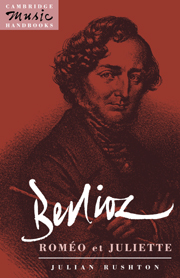Book contents
- Frontmatter
- Contents
- List of abbreviations and acknowledgements
- 1 Introduction
- 2 The genesis of Roméo et Juliette
- 3 Berlioz, Shakespeare, and Garrick
- 4 Exordium: Introduction and Prologue; Roméo seul
- 5 The heart of the matter: Scène d'amour; La reine Mab
- 6 Tragedy and reconciliation: Convoi funèbre; Roméo au tombeau; Finale
- 7 A view from 1839 by Stephen Heller
- 8 Performance and reception: 1839 and beyond
- 9 Afterword: Roméo et Juliette as covert opera
- Appendix 1
- Appendix 2
- Notes
- Select bibliography
- Index
3 - Berlioz, Shakespeare, and Garrick
Published online by Cambridge University Press: 18 November 2009
- Frontmatter
- Contents
- List of abbreviations and acknowledgements
- 1 Introduction
- 2 The genesis of Roméo et Juliette
- 3 Berlioz, Shakespeare, and Garrick
- 4 Exordium: Introduction and Prologue; Roméo seul
- 5 The heart of the matter: Scène d'amour; La reine Mab
- 6 Tragedy and reconciliation: Convoi funèbre; Roméo au tombeau; Finale
- 7 A view from 1839 by Stephen Heller
- 8 Performance and reception: 1839 and beyond
- 9 Afterword: Roméo et Juliette as covert opera
- Appendix 1
- Appendix 2
- Notes
- Select bibliography
- Index
Summary
When Berlioz arrived to study medicine in Paris in 1821, the French cultural establishment was dominated by a neo-classical, post-Racine tradition which had endured since the seventeenth century. Berlioz was brought up on a classical diet; yet it is clear from his account of reading Virgil that he valued artistic works for their emotional truth rather than for those austere, architectural qualities which we tend to associate with neo-classicism. And passion, of course, was what he later found in his first musical hero, Gluck, whose Iphigénie operas (both based on neo-classical French plays) he adored. He recognized in true classicism a rhetorical framework for the ordering of experience which never precludes powerful, indeed harrowing emotions. In his Stendhal-like article of 1832 he called music which (in his view) merely filled up a form with ideas ‘classical’. Thus he was predisposed to favour works which, like Beethoven's symphonies rather than those of Haydn and Mozart, were ‘romantic’ in that the idea determined the form.
The language of ‘expressive instrumental music’ was revealed to Berlioz by Beethoven, but he was if anything still more susceptible to literature; he enthusiastically accepted the Romantic vogue for Goethe, Schiller, Scott, and Byron, whose works became a quarry for literary, visual, and musical inspiration. The influence of Shakespeare was incomparably greater than these, and still more emblematic of rebellion because, until 1827, he had been condescended to by French cultural orthodoxy as an inspired barbarian whose works needed severe revision to become palatable. Shakespeare's true value was appreciated only when his works were given in English, even though the 1827 audience could scarcely grasp their poetic beauty.
- Type
- Chapter
- Information
- Berlioz: Roméo et Juliette , pp. 15 - 20Publisher: Cambridge University PressPrint publication year: 1994

